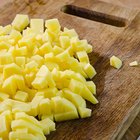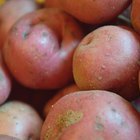YelenaYemchuk/iStock/GettyImages
Few foods rival potatoes in their combination of low cost, long storage, good nutrition and culinary versatility. These many virtues are balanced by a few flaws, such as their tendency to darken and turn brown almost immediately once they're peeled or cut. Acidic liquids applied to the potato's cut surface slows this reaction significantly.
Getting a Reaction
Like most fruits and vegetables, potatoes contain a lot of versatile chemical compounds called phenols. They're responsible for many of the flavors and aromas in foods, and they're also potent antioxidants, but primarily phenols act as a chemical defense for the plant. When you sever the potato's internal cell walls by cutting or peeling it, you expose those phenols to both the outside oxygen and an enzyme that's normally trapped within the cells. Those three ingredients react with each other, creating the familiar brown discoloration you see in potatoes, apples and other produce. The brown areas irritate plant pests' tender tissues, deterring most insects and larvae.
It's a Chemical Thing
Humans work best under favorable environmental conditions, and so do chemical reactions. Any chemical process -- including the browning of potatoes -- can be inhibited by identifying and controlling a few key factors. For example, the enzymes that create the browning reaction work poorly in an acidic environment. When you rub a cut potato with lemon juice, it slows the reaction to a crawl. A more practical technique is to fill a bowl with water and then pour in a splash of lemon juice to make it acidic. If you drop your cut potatoes into the water immediately, they'll stay white for a day or two until they're cooked.
A Few Tart Alternatives
Lemon juice is inexpensive and effective, but it isn't the only acid you can use to protect your potatoes. You can achieve the same effect by pouring a splash of vinegar or cider vinegar into your bowl of water. Restaurants usually mix a powdered preservative into the water when they cut buckets of potatoes for later use. These usually contain a high percentage of ascorbic acid -- better known as vitamin C -- or citric acid. The packages of anti-browning powder sold in your supermarket produce section contain the same ingredients, and will work for potatoes just as well as for apples and bananas.
Other Controllable Factors
Diluting your acidic ingredient with water is a clever technique, because the water provides a second defense against browning. The chemical reaction that causes browning requires oxygen, and submerging the potatoes in water prevents contact with the outside air. That can slow browning, even without your lemon juice. The reaction is also slowed by low temperatures, so cold water is even more effective. When you need to prepare potatoes ahead of time, combine all three factors for the best results. Put an acidic ingredient in the water, ensure the potatoes are completely immersed and refrigerate the bowl or container until you need the potatoes.
Related Articles
Can You Peel Potatoes the Day Before ...

What Keeps Shredded Potatoes From ...

Does Baking Soda Prevent Apples from ...
How to Keep Peach Preserves From ...

What Happens to Bananas Dipped in Lemon ...

How to Keep Peeled Vegetables From ...

How Long Can Raw Potatoes Be Kept in ...

How Do I Preserve Sliced Potatoes?

How to Keep French Fries From Turning ...

Can You Eat Peeled Potatoes After ...
How to Keep Granny Smith Apples From ...

The Best Potatoes For Shredded Hash ...
How to Make Homemade Mashed Potatoes ...
How to Pressure Cook Medium Red Potatoes
How to Blanch Red Potatoes for Peeling

How to Boil Cubed Potatoes to Pan Fry ...

How to Make Cheesy Potatoes Without ...

What Are Yellow Potatoes?

Glycolic Acid for Stretch Marks

How to Cook Petite Red Potatoes
References
- On Food and Cooking: The Science and Lore of the Kitchen; Harold McGee
Writer Bio
Fred Decker is a trained chef and prolific freelance writer. In previous careers, he sold insurance and mutual funds, and was a longtime retailer. He was educated at Memorial University of Newfoundland and the Northern Alberta Institute of Technology. His articles have appeared on numerous home and garden sites including GoneOutdoors, TheNest and eHow.